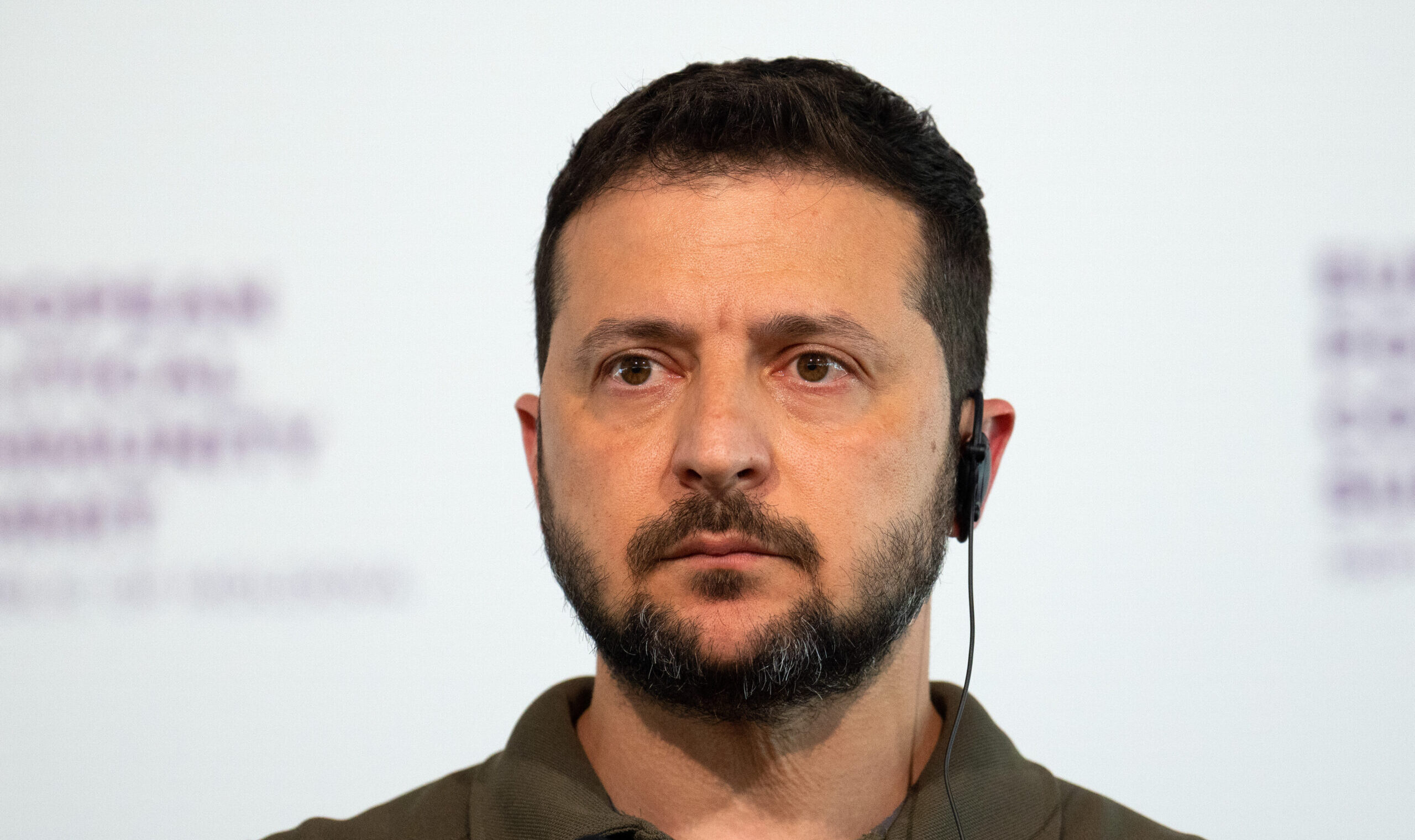On Russia–Ukraine, Scott Pelley Distorts Reality
The CBS News reporter’s interview of Volodymyr Zelensky offered a glaring example of journalistic malpractice.

As I discuss at length in my 2022 book, Unreliable Watchdog: The News Media and U.S. Foreign Policy, prominent Western press outlets have served as willing conduits for Washington’s propaganda regarding international issues—especially armed conflicts. The proliferation of thoroughly distorted, pro-Ukraine coverage is the most recent example. An April 13, 2025, segment on the CBS television news program 60 Minutes highlighted the problem.
The segment, hosted by Scott Pelley, featured a lengthy interview with Ukraine’s President Volodymyr Zelensky. One striking aspect was Pelley’s failure to challenge any of Zelensky’s assertions, no matter how controversial or dubious. A willingness to ask tough questions, especially of a leader that the United States and its NATO allies clearly regard as a client, is a key test that distinguishes propaganda from genuine journalism. Pelley, however, casually echoed the official line of NATO governments that Russia’s February 2022 invasion of Ukraine was entirely “unprovoked.”
Multiple foreign affairs experts have made the case that NATO’s inexorable expansion eastward toward Russia’s border, and especially the stated intention of NATO leaders and Kiev to bring Ukraine into the alliance despite Moscow’s heated objections, most definitely did constitute a provocation. Pelley simply failed to mention that long-standing controversy in Western academic and policy circles. Indeed, he allowed Zelensky to turn history on its head without the slightest challenge. Citing the carnage in his country, the Ukrainian leader asserted that the destruction and loss of life was “all for Vladimir Putin’s vanity war to expand Russia to NATO’s doorstep” (emphasis added).
Merely looking at a series of maps examining the shifting boundaries between NATO and Russia since the end of the Cold War demonstrates conclusively which side was engaging in expansionism. That line of demarcation has shifted many hundreds of miles toward Russia’s border, and nearly all of that shift took place before Moscow finally went on the offensive and seized Crimea in 2014. Any journalist not serving as a willing propagandist for Ukraine and its NATO sponsors would have at least raised questions about Zelensky’s version of events.
Equally annoying, Pelley seemed intent on presenting President Donald Trump’s calling Zelensky a “dictator without elections” as an obvious absurdity. Pelley’s presentation, by omitting key details, was blatantly misleading. To be sure, Zelensky had been elected in 2019, but his term had expired in the spring of 2024 and there is no indication when—or if—new elections will be held. Moreover, years before Zelensky was elected, a putsch drove a democratically elected, Russian-friendly president from power. Today, Zelensky’s allies thoroughly control Ukraine’s rump parliament, shorn of potential opposition members, so his rule can be perpetuated indefinitely.
It is doubtful that Pelley would have continued to describe Donald Trump as a “democratically elected” president based on his 2016 electoral victory if Trump had declared martial law to remain in power for years following the expiration of his term on January 20, 2021. But the CBS journalist apparently had no trouble performing such mental gymnastics in the case of Zelensky’s rule.
Nor did Pelley ask about the Ukrainian leader’s abundance of other anti-democratic abuses: outlawing nearly all opposition political parties, maintaining a stifling censorship system, arresting and imprisoning critics without even a semblance of due process, and even using a unit of his intelligence apparatus to assassinate opponents. Pelley did not give his viewers even a hint that such abuses take place in today’s “democratic” Ukraine.
It might be tempting to give Pelley the benefit of the doubt and attribute his defective coverage of the Ukraine issue to an exceptional bias in favor of that country because it is suffering from Russia’s decision to use military force. However, 60 Minutes in general and Pelley in particular have been disturbingly willing to echo Washington’s official stance on numerous other foreign policy issues. Indeed, they have been reliable conduits for U.S. propaganda for decades.
Pelley’s coverage of Syria’s civil war offers a graphic example. CBS telecast multiple 60 Minutes segments over the years on the conflict in that country. Nearly all of them were simplistic melodramas featuring Bashar al-Assad’s government as the epitome of evil and the Sunni Islamist rebels as “freedom fighters.” Pelley rarely even mentioned the Islamist orientation of the groups, much less that the CBS crew obtained access to scenes of alleged atrocities by Assad’s government forces only with the acquiescence and assistance of rebel leaders. Evidence of atrocities by rebel military units, of course, remained invisible. Such coverage corresponded closely to the position adopted by U.S. officials.
With the triumph of Hayat Tahrir al-Sham, Americans are now beginning to get a clearer view of the actual nature of the militants the U.S. government helped bring to power by sanctioning and bombing Assad’s Syria. Beheadings and other forms of execution directed against Assad regime officials began to take place within days of the rebel victory. More recently, forces of the new government launched a military offensive against the Alawite population in western Syria, the homeland of Assad and his supporters, killing more than 1,000 people—mostly civilians. Assad’s power base had consisted of a coalition of religious minorities made up primarily of Alawites (a Shiite offshoot), Christians, and Druze. It will be unsurprising if all of those groups prove to be targets of persecution by the new, overwhelmingly Sunni government, backed by the two leading Sunni powers in the region, Turkey and Saudi Arabia.
It will be interesting to see if Pelley and his media colleagues provide meaningful coverage if such abuses take place. Given the rapid onset of amnesia that seems to afflict prominent members of the establishment news media once a U.S. foreign policy crusade unravels, any other response would be a surprise. A dramatic plunge in attention has characterized coverage of the Balkans, Iraq, Libya, and Afghanistan. Pelley and his colleagues have already moved on to Ukraine and are busily portraying Russia as the epitome of villainy and Ukraine as a tragic martyr for democracy. Their new, principal sub-theme is that the evil Donald Trump may well betray America’s noble Ukrainian ally.
Unfortunately, the lengthy record of establishment media outlets being reliable conduits for pro-war propaganda will likely remain intact, and Scott Pelley’s career will continue to prosper accordingly.
The post On Russia–Ukraine, Scott Pelley Distorts Reality appeared first on The American Conservative.

